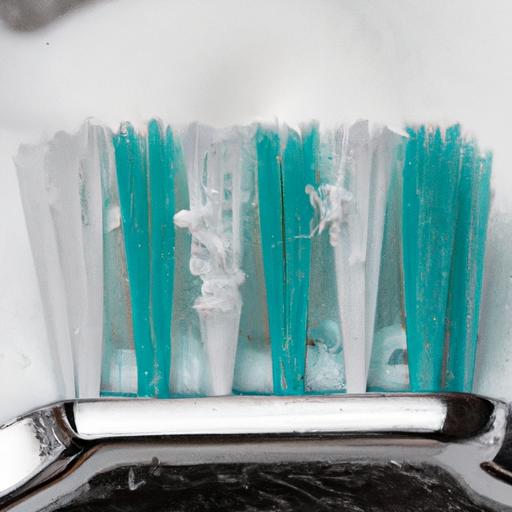How Salt Helps in Dental Problems
Dental problems are a common issue that affects many people worldwide. From tooth decay to gum diseases, these issues can cause discomfort and pain, making it difficult to eat and perform daily activities. While there are various treatments available to alleviate dental problems, one natural remedy that has gained popularity in recent years is salt. In this article, we’ll explore the benefits of salt in dental health and how it can help with dental problems.
The Benefits of Salt in Dental Health

Salt as a Natural Disinfectant
Salt has natural antibacterial properties that can help eliminate harmful bacteria in the mouth. When bacteria accumulate in the mouth, they can lead to tooth decay, gum disease, bad breath, and other dental problems. Using a saltwater rinse can help kill these bacteria and prevent them from spreading, promoting oral health.
Salt as a Pain Reliever
Salt can also act as a natural pain reliever for dental problems. For instance, if you have a toothache, rinsing your mouth with warm salt water can alleviate the pain and reduce inflammation. Salt’s anti-inflammatory properties can also help with swollen gums, reducing discomfort and pain.
Salt as a Teeth Whitener
Salt is a natural teeth whitener that can help remove stains and discoloration from the teeth. When used in combination with baking soda, salt can help scrub away surface stains, leaving your teeth looking brighter and healthier. This natural teeth whitening method is also cost-effective and easy to use, making it an ideal option for those looking to improve their smile without breaking the bank.
Overall, salt has many benefits when it comes to dental health. From disinfecting the mouth to relieving pain and whitening teeth, salt is a natural remedy that can help with various dental problems. In the next section, we’ll explore different ways to use salt for dental problems.
Different Ways to Use Salt for Dental Problems
There are various ways to use salt for dental problems, depending on the issue you’re experiencing. Here are some of the most effective ways to use salt for dental health:
Saltwater Rinse
One of the most popular ways to use salt for dental problems is by rinsing your mouth with saltwater. To make a saltwater rinse, mix a teaspoon of salt in a glass of warm water and swish the mixture around your mouth for 30 seconds before spitting it out. This can help kill bacteria, reduce inflammation, and promote oral health.
Salt and Baking Soda Mixture for Cleaning Teeth
Another way to use salt for dental problems is by mixing it with baking soda to create a natural teeth cleaning solution. Mix equal parts of salt and baking soda, dampen your toothbrush, and dip it in the mixture. Brush your teeth as you normally would, focusing on areas with stains and discoloration. Rinse your mouth thoroughly with water afterward.
Stay tuned for the next sections that will cover “Precautions when using salt for dental health” and “Other ways to maintain good dental health.”
Different Ways to Use Salt for Dental Problems
Saltwater Rinse
A saltwater rinse is one of the easiest and most effective ways to use salt for dental problems. It can help kill bacteria, reduce inflammation, and promote oral health. To make a saltwater rinse, mix a teaspoon of salt in a glass of warm water and swish the mixture around your mouth for 30 seconds before spitting it out. Repeat this process 2-3 times a day, especially after meals or before bedtime.
Salt and Baking Soda Mixture for Cleaning Teeth
Another way to use salt for dental problems is by mixing it with baking soda to create a natural teeth cleaning solution. This mixture can help remove stains and whiten teeth. To make the mixture, combine equal parts of salt and baking soda in a small bowl. Dampen your toothbrush, dip it in the mixture, and brush your teeth as you normally would. Rinse your mouth thoroughly with water afterward.
Salt and Coconut Oil Mixture for Oil Pulling
Oil pulling is an ancient Ayurvedic practice that involves swishing oil in your mouth to improve oral health. When combined with salt, it can help kill bacteria, reduce inflammation, and promote healthy gums. To make a salt and coconut oil mixture for oil pulling, mix a tablespoon of coconut oil with a teaspoon of salt. Swish the mixture around your mouth for 10-15 minutes before spitting it out. Rinse your mouth thoroughly with water afterward.
Precautions When Using Salt for Dental Health
While salt can be an effective natural remedy for dental problems, there are some precautions to keep in mind when using it. Here are some things to consider:
Proper Usage and Concentration
When using salt for dental problems, it’s essential to use the proper concentration. Too much salt can be abrasive and damage tooth enamel, while too little salt may not be effective. A teaspoon of salt in a glass of warm water is usually the right concentration for a saltwater rinse. If you’re using salt in other ways, be sure to follow the recommended guidelines.
When to Avoid Using Salt for Dental Problems
While salt can be helpful for many dental problems, there are some instances where it’s best to avoid using it. For instance, if you have open sores or wounds in your mouth, salt can be extremely painful and may hinder the healing process. Additionally, if you have high blood pressure or are on a low-sodium diet, using salt for dental problems may not be suitable for you.
In the next section, we’ll explore other ways to maintain good dental health, including tips for brushing, flossing, and visiting the dentist regularly.
Precautions When Using Salt for Dental Health
While salt can be a useful natural remedy for dental problems, it’s essential to use it correctly and take precautions when doing so. Here are some of the precautions you should take when using salt for dental health:
Proper Usage and Concentration
Using too much salt or using it too frequently can damage the enamel of your teeth and irritate your gums. It’s essential to follow the recommended concentration and usage guidelines when using salt for dental problems. Avoid swallowing the saltwater rinse or any other salt mixture you may be using.
When to Avoid Using Salt for Dental Problems
While salt can help with various dental problems, there are some situations where you should avoid using it. For instance, if you have open sores or cuts in your mouth, using salt can cause further irritation and discomfort. If you’re unsure whether using salt is safe for your dental problem, consult with your dentist or healthcare provider first.
Other Ways to Maintain Good Dental Health
While salt can be a useful natural remedy for dental problems, it’s crucial to maintain good dental hygiene regularly. Here are some other ways to maintain good dental health:
Brushing and Flossing Regularly
Brush your teeth at least twice a day, using fluoride toothpaste and a soft-bristled toothbrush. Floss at least once a day to remove food particles and plaque from between your teeth. This can help prevent tooth decay, gum disease, and other dental problems.
Visiting the Dentist Regularly
Visit your dentist at least twice a year for regular checkups and cleanings. Your dentist can identify dental problems early on, providing you with timely treatment and preventing them from getting worse. Regular dental visits can also help keep your teeth and gums healthy and prevent serious dental problems.
In conclusion, salt has many benefits when it comes to dental health, from disinfecting the mouth to relieving pain and whitening teeth. However, it’s essential to use it correctly, taking precautions when doing so. Maintaining good dental hygiene regularly is also crucial for preventing dental problems and maintaining optimal oral health. At Zahnweiss Info, we’re dedicated to providing you with the latest updates on dental health news, treatments and therapies, inspiring patient stories, and expert advice.




